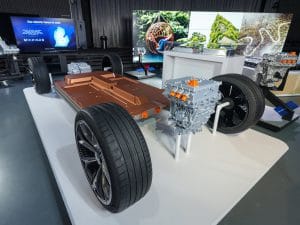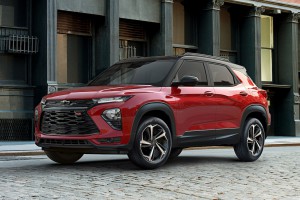
GM released a new, teaser image of the upcoming Cadillac Lyriq. The car’s debut in L.A. has been cancelled due to coronavirus concerns.
Worries about the spreading coronavirus epidemic has led a number of automakers to curb travel and scale back some of their public events, General Motors announcing it will cancel the April 2 debut of Cadillac’s first all-electric model, the Lyriq.
GM had already cancelled several media drive events, including one for the Chevrolet TrailBlazer that was to have taken place this week, as well as another of the Cadillac CT4 and CT5 sedans originally scheduled for next week. Now, the automaker says, it is indefinitely delaying the public introduction of the Cadillac Lyriq “out of an abundance of caution,” while “evaluating future plans.”
The decision to scrub the unveiling of the Cadillac Lyriq wasn’t easy to make, according to a GM insider who spoke to TheDetroitBureau.com on background. The battery-electric SUV is set to become one of the first in a wave of 20 new, all-electric products GM last week confirmed it will bring to production by 2023. It also will be the first ever to wear the luxury brand’s crest logo.
(GM outlines EV plan to cover every brand, product segment and price range.)
Automakers around the world are struggling to cope with the coronavirus epidemic. Early efforts to contain the outbreak in China saw much of that country’s automotive production base shut down. Even now, Michael Dunne, lead analyst with Asian consulting service ZoZoGo, says most Chinese plants are operating, if at all, at well below capacity, with only 20 to 30% of their employees reporting for work. Retail sales in China were off by nearly 90% last month, according to the country’s automotive trade association.

General Motors reveals its all-new modular platform and battery system, Ultium, at the Design Dome on the GM Tech Center campus in Warren, Michigan.
The crisis has been spilling into other markets. Hyundai has had to sharply pare back production at its South Korean plants due to parts shortages, as well as the growing coronavirus outbreak there.
The newly announced nationwide lockdown in Italy is expected to have significant impact on that country’s auto industry and will likely spill over to other parts of Europe, quickly impacting factories dependent upon Italian-made parts and components, several experts told TheDetroitBureau.com.
Automakers in the U.S. have resorted to costly air freight in an attempt to handle parts shortages that could shut down American plants, but experts warn it may be just a matter of time before shutdown happen, especially as more cases of the disease are popping up across the country.
“There will be an impact on (U.S. vehicle) production within a month, month-and-a-half,” Carla Bailo, CEO of the Center for Automotive Research, told TheDetroitBureau.com in an interview. And she added that it is likely shortages “will be felt even sooner on the parts and service side,” impacting not just routine maintenance but vehicle repair shops, as well.
(GM exercising caution as coronavirus epidemic spreads.)
Even before GM’s latest move, the crisis had already impacted the public-facing side of the global auto industry. Just last week, the annual Geneva International Motor Show was cancelled for the first time in its 90-year history due to an emergency mandate by the Swiss government banning large public gatherings.
One of the big questions, now, is whether the New York International Auto Show scheduled to take place early next month will take place. Organizers have said they plan to hold to their schedule but acknowledged they are watching the situation carefully before making a final decision.
The annual Beijing Auto Show, which traditionally overlaps New York’s, has been postponed but could yet be cancelled entirely if that country can’t bring the coronavirus epidemic under control any time soon.
GM is so far the only automaker to have formally cancelled any U.S. media event. The April 2 debut of the Cadillac Lyriq was a particular tough one to postpone considering it will not only be the first-ever pure electric model from the luxury brand but also the first step in what Caddy President Steve Carlisle has said will be a switch entirely to battery-electric cars by the end of this decade.
It is unclear how GM will proceed. It could wait and reschedule the media event that was to have taken place in Los Angeles. It could also follow the approach taken by a number of automakers who had been scheduled to unveil new products in Geneva this month.
Mercedes-Benz, BMW, McLaren and others instead staged something of a virtual auto show, introducing their new products through webcasts that took place at the same time they were originally supposed to be revealed at Geneva’s Palexpo convention center.
(Global auto sales expected to fall 2.5% this year as coronavirus impact spreads.)
What’s becoming increasingly apparent is that until the coronavirus epidemic is brought under control it will be anything but business-as-usual for the global auto industry.


